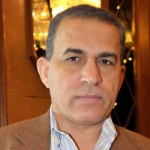Who is this man?
Soliman Gouda
Al-Masry Al-Youm newspaper
Gouda criticises presidential adviser Essam Al-Haddad for failing to gain fruitful results from his foreign trips. In his first visit to the United States, Haddad traveled with an Egyptian delegation to prepare for President Morsy’s meeting with Barack Obama, after the latter won presidential elections for the second time. The trip was cancelled and no new date was scheduled or announced. His visit to the United Arab Emirates, where he was supposed to help set free a number of arrested Muslim Brotherhood members has not led to any good news. Rather it increased tensions between the two countries.
Egyptians ask who Haddad is and what exactly is his professional experience that qualifies him to stay so exceptionally close to President Morsy? Haddad was initially a doctor with postgraduate qualifications in management. He lacks the fundamental experience in politics necessary to be given such a vital role in the palace. Since assuming his position, Haddad has performed almost all the duties of the foreign ministry, conducting vital visits to important countries and helping sort out the issues of the Muslim Brotherhood abroad. Looking back at Mubarak times, Gouda says that Egyptians used to know the identity of the people close to him. For example, they knew the background of Osama Al-Baz before he was the head of Mubarak’s office for political affairs. People also used to acknowledge Boutros Boutros-Ghali before he took over as the minister of state for foreign affairs. Today the situation is extremely different. Egyptians are not aware of who Haddad is and why he holds a position that gives him the green light to conduct Egypt’s relations with important countries.
The vacant position
Mohamed Salmawi
Al-Masry Al-Youm newspaper
The large amount attention given to Saudi sheikh Mohamed Abdel Rahman El-Oriefy, when he gave the Friday speech at Amr Ebn Al-Aas mosque in old Cairo, means that Egyptians are craving to see a leader who reminds them of their country’s importance. Salmawi believes that the position of a true leader in Egypt is currently vacant. The people are used to hearing nothing but Morsy’s public speeches. That is why Egyptians pay extra attention to words said by a Saudi sheikh when he comes to praise their country.
The writer asks if it is logical for a normal Friday speech to be the main talk of almost all talk shows and radio programmes and the centre of public debate? Although Salmawi is not against El-Oriefy’s speech, he argues that Egyptians are longing for statements that fill them with pride. Since the January 25 Revolution, the writer stresses that Egyptians have been missing a genuine leader, a person who takes charge of the country and boosts morale. The 2011 uprising, however, gave the chance for some figures to appear as potential leaders. Until now, nobody could be looked up to as a prospective chief. It was only a simple speech, but the influence it has left is a signal that this country is in a dire need of a good leader.





